Unit 2 The universal language Grammar and usage(1)_ Ellipsis 课件(40张)
文档属性
| 名称 | Unit 2 The universal language Grammar and usage(1)_ Ellipsis 课件(40张) | 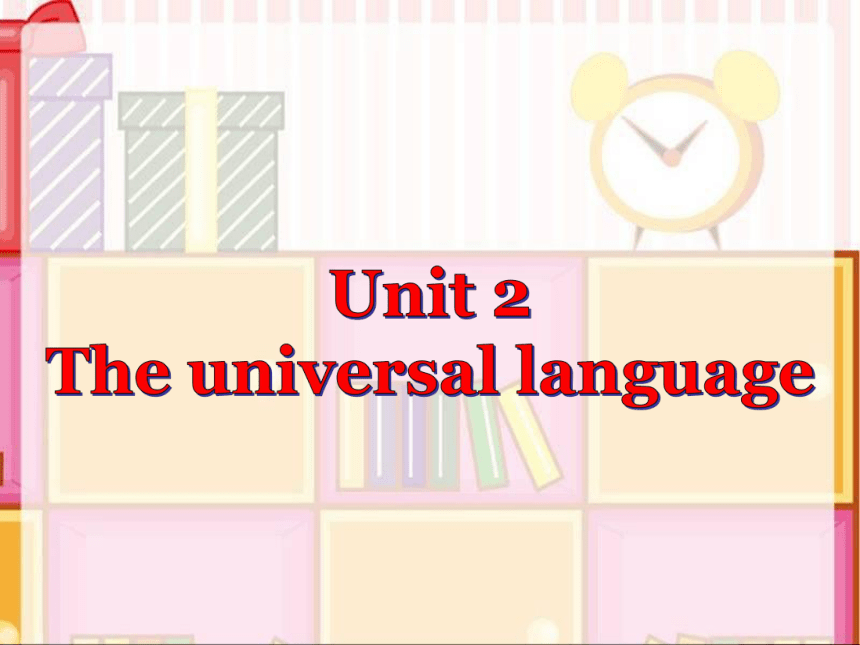 | |
| 格式 | zip | ||
| 文件大小 | 250.0KB | ||
| 资源类型 | 教案 | ||
| 版本资源 | 牛津译林版 | ||
| 科目 | 英语 | ||
| 更新时间 | 2019-08-01 21:49:27 | ||
图片预览

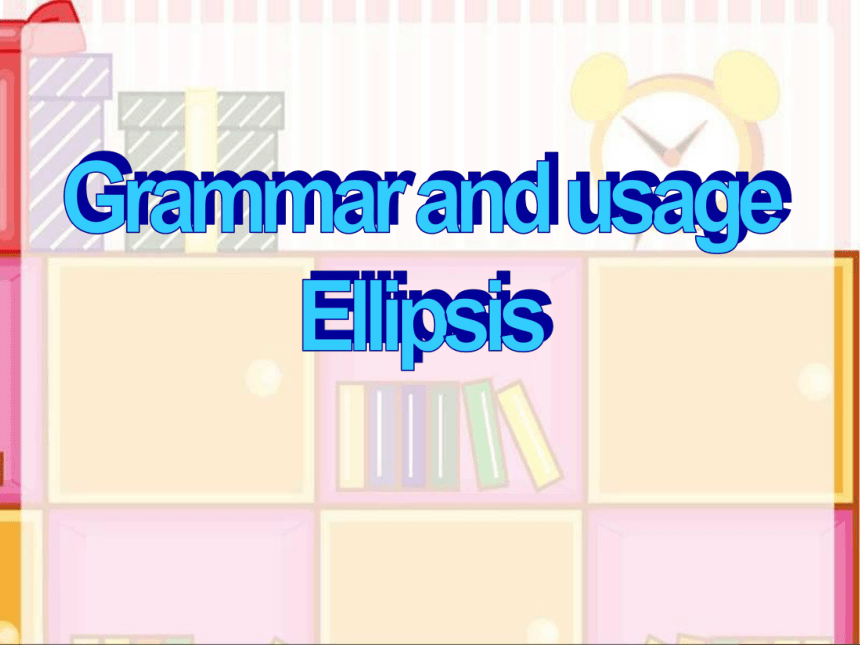
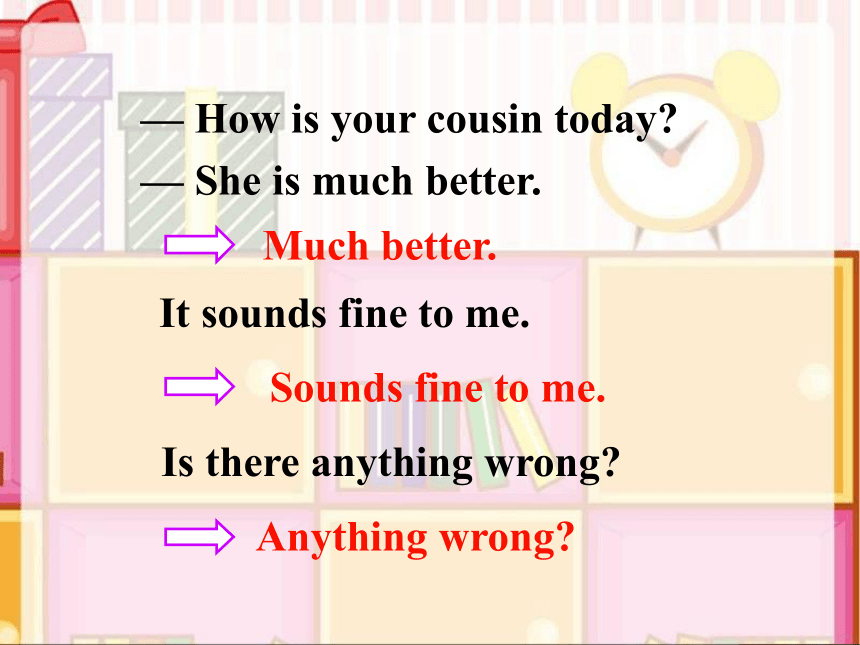
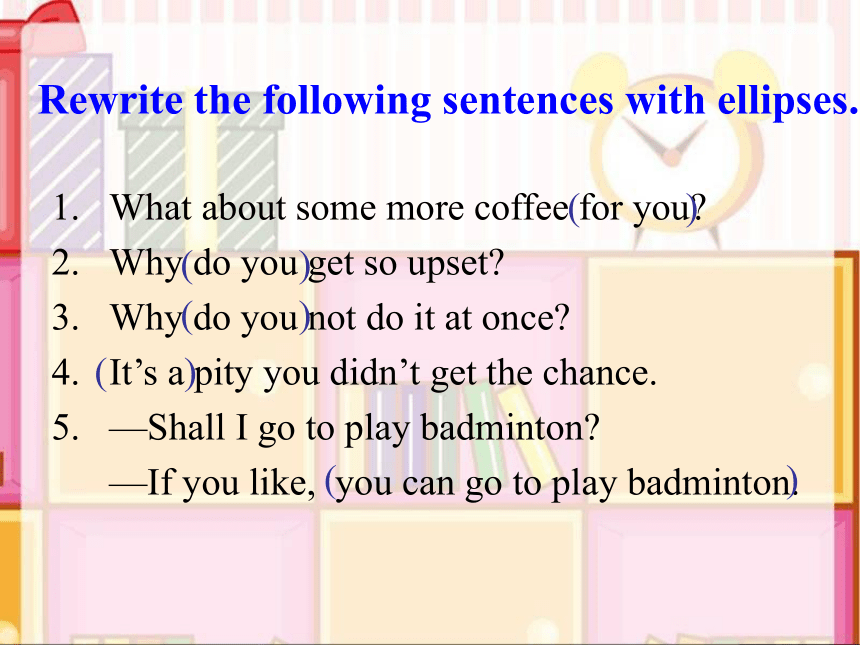
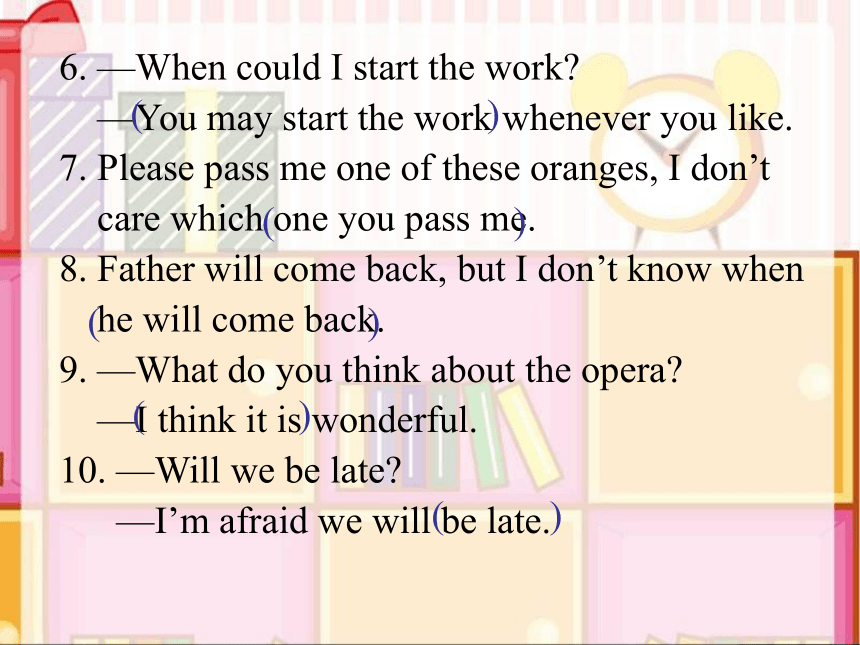
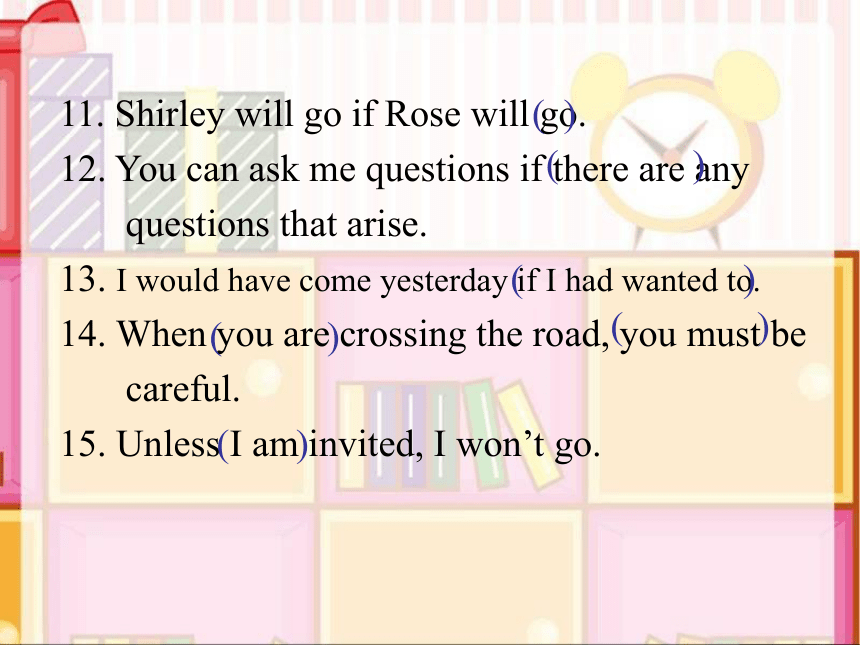
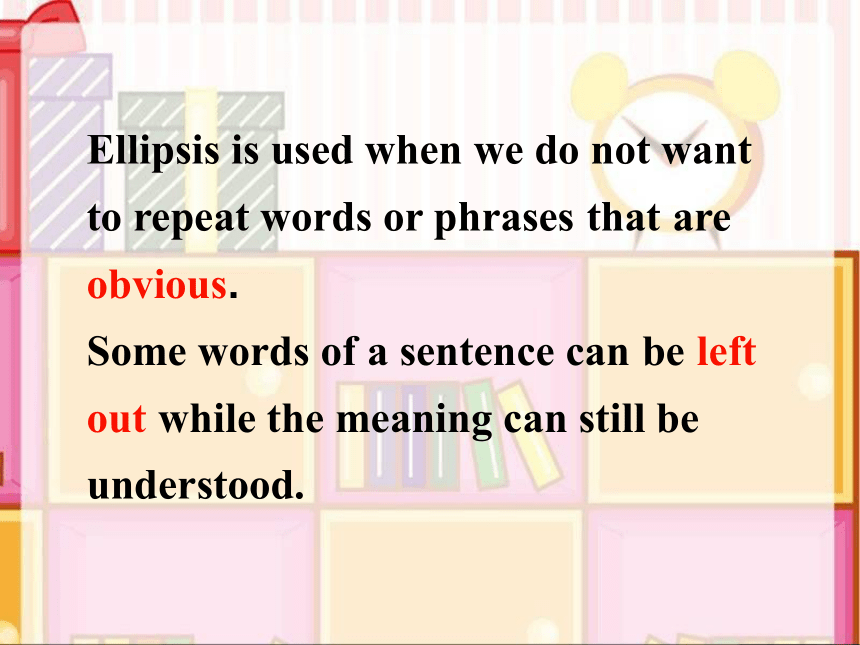
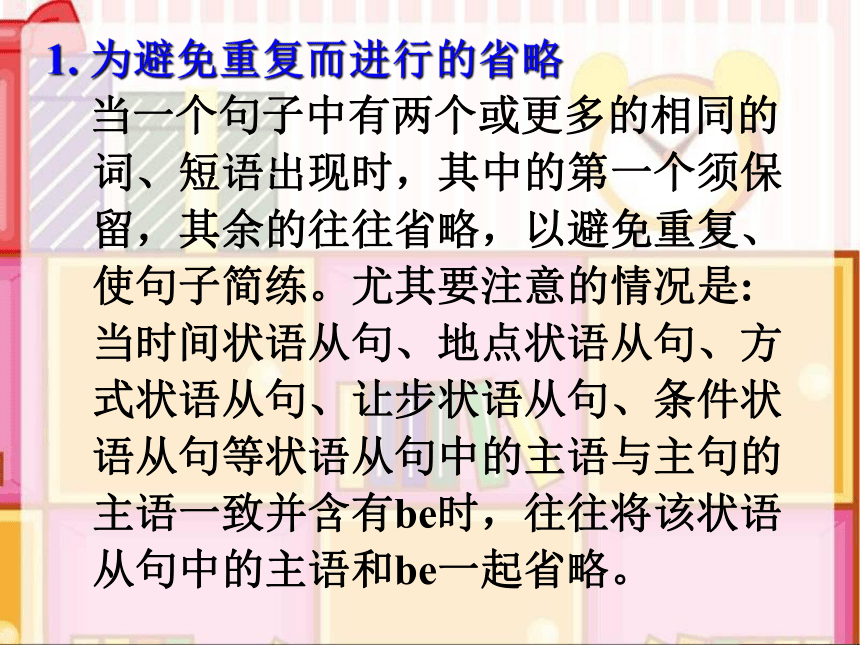

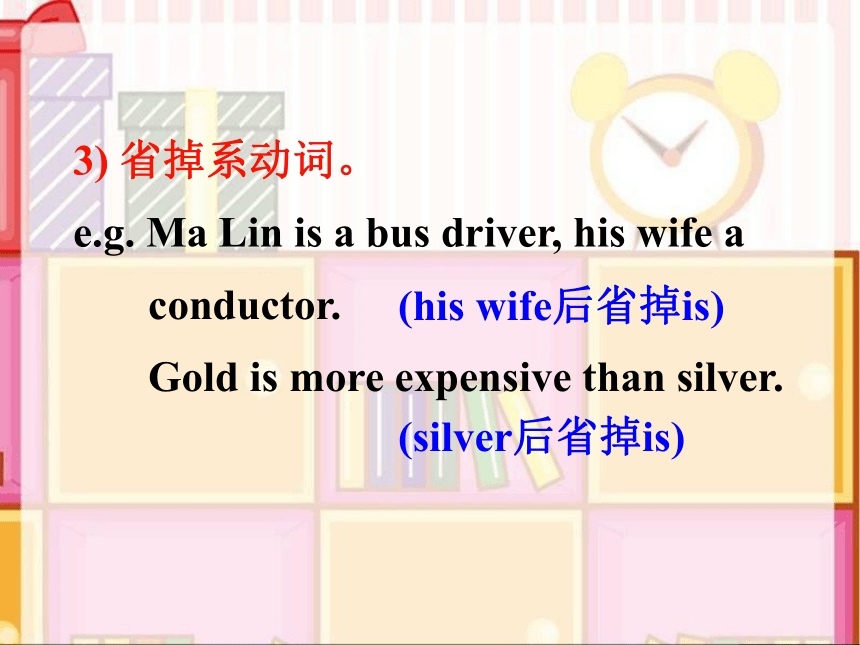
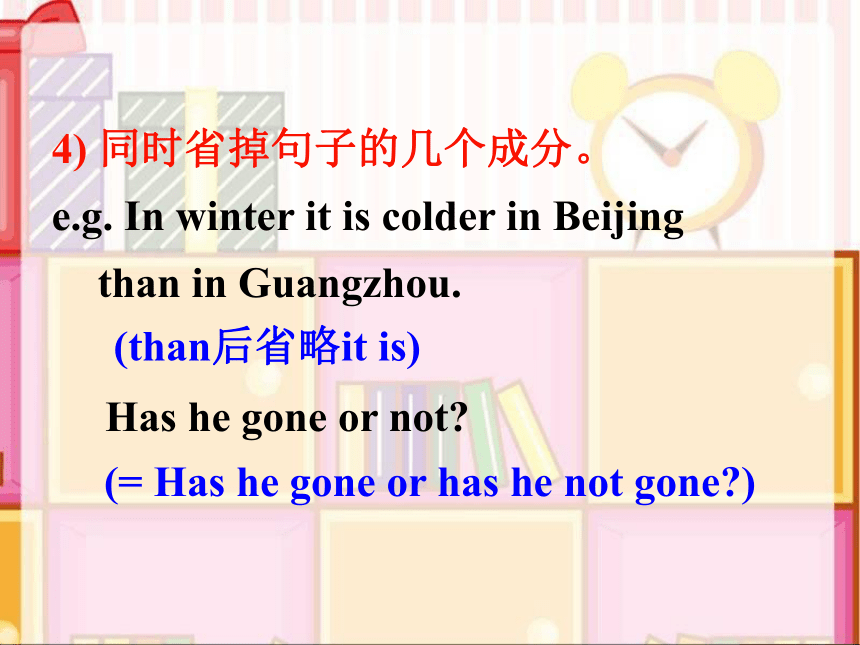
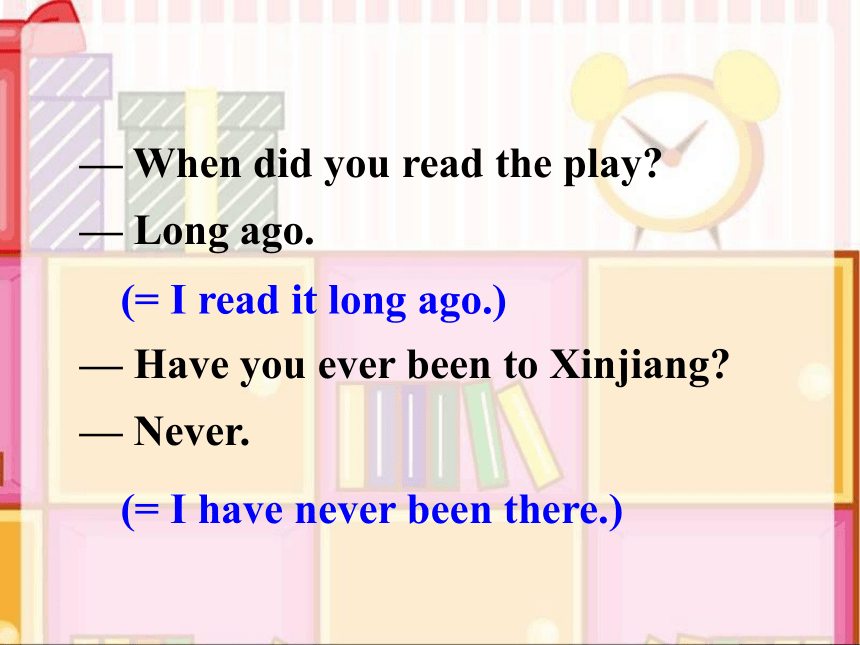
文档简介
课件40张PPT。Unit 2
The universal languageGrammar and usage
Ellipsis— How is your cousin today?
— She is much better.Much better.It sounds fine to me.Sounds fine to me.Is there anything wrong?Anything wrong?Rewrite the following sentences with ellipses.What about some more coffee for you?
Why do you get so upset?
Why do you not do it at once?
It’s a pity you didn’t get the chance.
—Shall I go to play badminton?
—If you like, you can go to play badminton.
( )( )( )( )( ) 6. —When could I start the work?
—You may start the work whenever you like.
7. Please pass me one of these oranges, I don’t
care which one you pass me.
8. Father will come back, but I don’t know when
he will come back.
9. —What do you think about the opera?
—I think it is wonderful.
10. —Will we be late?
—I’m afraid we will be late.( )( )( )( )( )11. Shirley will go if Rose will go.
12. You can ask me questions if there are any
questions that arise.
13. I would have come yesterday if I had wanted to.
14. When you are crossing the road, you must be
careful.
15. Unless I am invited, I won’t go.( )( )( )( )( )( )Ellipsis is used when we do not want to repeat words or phrases that are obvious.
Some words of a sentence can be left out while the meaning can still be understood.1. 为避免重复而进行的省略
当一个句子中有两个或更多的相同的词、短语出现时,其中的第一个须保留,其余的往往省略,以避免重复、使句子简练。尤其要注意的情况是: 当时间状语从句、地点状语从句、方式状语从句、让步状语从句、条件状语从句等状语从句中的主语与主句的主语一致并含有be时,往往将该状语从句中的主语和be一起省略。句子中常可省略的成分如下:
1) 省掉主语。如:
Thank you for your help.
See you tomorrow.
2) 省掉谓语动词。如:
Some of us study Russian, others English.
He got up earlier than I today. (others后省掉study) (前面省掉主语I)(前面省掉主语I)(I后省掉got up)3) 省掉系动词。
e.g. Ma Lin is a bus driver, his wife a
conductor.
Gold is more expensive than silver. (his wife后省掉is) (silver后省掉is)4) 同时省掉句子的几个成分。
e.g. In winter it is colder in Beijing than in Guangzhou.
Has he gone or not? (= Has he gone or has he not gone?) (than后省略it is) — When did you read the play?
— Long ago.
— Have you ever been to Xinjiang?
— Never. (= I have never been there.) (= I read it long ago.) ▲ 在if,when,though,as,as if等连词引导的从句中,如果主从句的主语一致,又含有be动词时,常把从句中的主语和be动词省略。
e.g. When you do this exercise, make changes in the sentence structure when necessary. (when后省掉it is) He is very good at painting, though
very young.
The boy looked as if afraid of nothing. (= though he is very young) (= as if he were afraid of nothing) ▲ 在下面的句子中,动词不定式to的后面省去了动词原形及其以后的部分。
e.g. You may go with them if you want to.
— Will you be able to come?
— I’d love to. But I’m busy. (to后省去go with them) (to后省掉come)e.g. He is twelve years old. 他十二岁。
I walked for ten miles. 我走了十英里路。 2. 语法上允许的省略。有些成分的被省略是出于语法上的允许,以显得表述更为简明。He is twelve.I walked ten miles.3. 习惯用法上允许的省略。有些省略句的情况是出于习惯用法,尤其是在口语中。例如在问句中be常常省略,有时连主语一起省略:
e.g. Very easy? 很简单吗?
Why not? 为什么不?4. 省略语还经常出现在新闻标题或使用
说明中。
newspaper headlines:
Turandot on stage 图兰朵将要上演
signs and labels:
No smoking 禁止吸烟 instructions:
Do not bend
postcards and diaries
Have not had time to write diary
notes
Opera OK, costumes great例题解析[考例1]
The flowers his friend gave him will die unless ______ every day. (四川)
A. watered B. watering
C. water D. to water 选A。when, if, unless, though 等引导状语从句时,如果主从句的主语一致,又含有be动词时,常把从句中的主语和be动词省略,此处应为unless they are watered。[考例2]
Every evening after dinner, if not _____
from work, I will spend some time walking my dog. (湖南)
A. being tired B. tiring
C. tired D. to be tired[考例3]
Although ____ my opinion, the old professor didn’t come up with his own. (福建)
A. against B. on
C. for D. in选A。句意为:尽管老教授反对我的意见,可他也没提出自己的看法。完整的从句应为:Although he was against my opinion, 句子省略了从句中的主语和be动词。against one’s opinion反对某人的见解。介词on不与opinion搭配;for one’s opinion同意某人的见解;in one’s opinion在某人看来。―Are there any English story books
for us students in the library? ―There are only a few, ________. A. if any B. if there
C. if some D. if has 2. ―Would you like to go with us?
―Yes, _________.
A. I’d B. I’d like
C. I’d like to D. I’d like to do
3. ―Would you like to have a try once again? ― _________.
A. Yes, I like B. No, I don’t like it
C. Yes, I want very much
D. Yes, I’d like to4. ― What do you think made Mary so
upset?
― _______ her bicycle.
A. As she lost B. Lost
C. Losing
D. Because of losing 5. — When did they get down to the job?
??? — __________.
???A. Until they left
B. Till they arrived
???C. Since they finished it
D. Not until they turned to me
6. — Are you angry?
??? — Yes. He should at least answer when __.
??? A. speaking B. spoken to
C. spoken D. speaking to7. Be careful while _____ the street.
A. to cross B. crossing
C. he crosses D. being cross
8. ____ us for a dinner, don’t you?
A. Don’t you join B. Join
C. Have to join D. Let’s join9. I promise we’ll be there at 6 ______.
A. rainy or shine B. rains or shining
C. rain or shine D. rain or shining
10. In the car accident the child was hurt, but ____.
A. the mother is killed
B. the mother killed
C. the mother being killed
D. the mother has killed11. _____ I don’t remember where I met him.
A. Fact is which B. What the fact is that C. The fact is what D. Fact is 12. He raised his hand ____ silence. A. as if to command
B. as though he going to command
C. as though to command
D. as of he commanding 13. Francis Preston Blair, Jr., ____ born in Kentucky, lived and practiced law in Missouri.
A. was B. he was
C. although D. who he was14. We are to install this instrument ___ .
A. as originally planned
B. as it originally planned
C. as was originally planned
D. as it being originally planned 15. ____, people and objects are presented in a flat, often angular, abstract manner in Jacob Lawrence’s paintings.
A. Always able to recognize
B. The ability to recognize always
C. While always recognizable
D. Always can be recognized 16. — Why do you want the book so much?
— ______, sir.
A. Studying B. Studies
C. Studied D. To study 17. This is an illness that can result in total blindness if ______.
A. to leave untreating
B. left untreated
C. leaving untreating
D. is left untreated 18. — Which would you like, chicken or fish?
— ______
A. I don’t think so. B. What if ?
C. Both. D. Neither can I.
19. You may take them all home ______.
A. if possible B. if can
C. unless so D. even if you can20. Doctors have said that as many as
50% of patients don’t take medicine
______.
A. like directed B. to be directed
C. as directed D. so that directed Homework1. Finish the exercises of C1 and C2 on page 109 of the work.
2. Preview the next section: Task
The universal languageGrammar and usage
Ellipsis— How is your cousin today?
— She is much better.Much better.It sounds fine to me.Sounds fine to me.Is there anything wrong?Anything wrong?Rewrite the following sentences with ellipses.What about some more coffee for you?
Why do you get so upset?
Why do you not do it at once?
It’s a pity you didn’t get the chance.
—Shall I go to play badminton?
—If you like, you can go to play badminton.
( )( )( )( )( ) 6. —When could I start the work?
—You may start the work whenever you like.
7. Please pass me one of these oranges, I don’t
care which one you pass me.
8. Father will come back, but I don’t know when
he will come back.
9. —What do you think about the opera?
—I think it is wonderful.
10. —Will we be late?
—I’m afraid we will be late.( )( )( )( )( )11. Shirley will go if Rose will go.
12. You can ask me questions if there are any
questions that arise.
13. I would have come yesterday if I had wanted to.
14. When you are crossing the road, you must be
careful.
15. Unless I am invited, I won’t go.( )( )( )( )( )( )Ellipsis is used when we do not want to repeat words or phrases that are obvious.
Some words of a sentence can be left out while the meaning can still be understood.1. 为避免重复而进行的省略
当一个句子中有两个或更多的相同的词、短语出现时,其中的第一个须保留,其余的往往省略,以避免重复、使句子简练。尤其要注意的情况是: 当时间状语从句、地点状语从句、方式状语从句、让步状语从句、条件状语从句等状语从句中的主语与主句的主语一致并含有be时,往往将该状语从句中的主语和be一起省略。句子中常可省略的成分如下:
1) 省掉主语。如:
Thank you for your help.
See you tomorrow.
2) 省掉谓语动词。如:
Some of us study Russian, others English.
He got up earlier than I today. (others后省掉study) (前面省掉主语I)(前面省掉主语I)(I后省掉got up)3) 省掉系动词。
e.g. Ma Lin is a bus driver, his wife a
conductor.
Gold is more expensive than silver. (his wife后省掉is) (silver后省掉is)4) 同时省掉句子的几个成分。
e.g. In winter it is colder in Beijing than in Guangzhou.
Has he gone or not? (= Has he gone or has he not gone?) (than后省略it is) — When did you read the play?
— Long ago.
— Have you ever been to Xinjiang?
— Never. (= I have never been there.) (= I read it long ago.) ▲ 在if,when,though,as,as if等连词引导的从句中,如果主从句的主语一致,又含有be动词时,常把从句中的主语和be动词省略。
e.g. When you do this exercise, make changes in the sentence structure when necessary. (when后省掉it is) He is very good at painting, though
very young.
The boy looked as if afraid of nothing. (= though he is very young) (= as if he were afraid of nothing) ▲ 在下面的句子中,动词不定式to的后面省去了动词原形及其以后的部分。
e.g. You may go with them if you want to.
— Will you be able to come?
— I’d love to. But I’m busy. (to后省去go with them) (to后省掉come)e.g. He is twelve years old. 他十二岁。
I walked for ten miles. 我走了十英里路。 2. 语法上允许的省略。有些成分的被省略是出于语法上的允许,以显得表述更为简明。He is twelve.I walked ten miles.3. 习惯用法上允许的省略。有些省略句的情况是出于习惯用法,尤其是在口语中。例如在问句中be常常省略,有时连主语一起省略:
e.g. Very easy? 很简单吗?
Why not? 为什么不?4. 省略语还经常出现在新闻标题或使用
说明中。
newspaper headlines:
Turandot on stage 图兰朵将要上演
signs and labels:
No smoking 禁止吸烟 instructions:
Do not bend
postcards and diaries
Have not had time to write diary
notes
Opera OK, costumes great例题解析[考例1]
The flowers his friend gave him will die unless ______ every day. (四川)
A. watered B. watering
C. water D. to water 选A。when, if, unless, though 等引导状语从句时,如果主从句的主语一致,又含有be动词时,常把从句中的主语和be动词省略,此处应为unless they are watered。[考例2]
Every evening after dinner, if not _____
from work, I will spend some time walking my dog. (湖南)
A. being tired B. tiring
C. tired D. to be tired[考例3]
Although ____ my opinion, the old professor didn’t come up with his own. (福建)
A. against B. on
C. for D. in选A。句意为:尽管老教授反对我的意见,可他也没提出自己的看法。完整的从句应为:Although he was against my opinion, 句子省略了从句中的主语和be动词。against one’s opinion反对某人的见解。介词on不与opinion搭配;for one’s opinion同意某人的见解;in one’s opinion在某人看来。―Are there any English story books
for us students in the library? ―There are only a few, ________. A. if any B. if there
C. if some D. if has 2. ―Would you like to go with us?
―Yes, _________.
A. I’d B. I’d like
C. I’d like to D. I’d like to do
3. ―Would you like to have a try once again? ― _________.
A. Yes, I like B. No, I don’t like it
C. Yes, I want very much
D. Yes, I’d like to4. ― What do you think made Mary so
upset?
― _______ her bicycle.
A. As she lost B. Lost
C. Losing
D. Because of losing 5. — When did they get down to the job?
??? — __________.
???A. Until they left
B. Till they arrived
???C. Since they finished it
D. Not until they turned to me
6. — Are you angry?
??? — Yes. He should at least answer when __.
??? A. speaking B. spoken to
C. spoken D. speaking to7. Be careful while _____ the street.
A. to cross B. crossing
C. he crosses D. being cross
8. ____ us for a dinner, don’t you?
A. Don’t you join B. Join
C. Have to join D. Let’s join9. I promise we’ll be there at 6 ______.
A. rainy or shine B. rains or shining
C. rain or shine D. rain or shining
10. In the car accident the child was hurt, but ____.
A. the mother is killed
B. the mother killed
C. the mother being killed
D. the mother has killed11. _____ I don’t remember where I met him.
A. Fact is which B. What the fact is that C. The fact is what D. Fact is 12. He raised his hand ____ silence. A. as if to command
B. as though he going to command
C. as though to command
D. as of he commanding 13. Francis Preston Blair, Jr., ____ born in Kentucky, lived and practiced law in Missouri.
A. was B. he was
C. although D. who he was14. We are to install this instrument ___ .
A. as originally planned
B. as it originally planned
C. as was originally planned
D. as it being originally planned 15. ____, people and objects are presented in a flat, often angular, abstract manner in Jacob Lawrence’s paintings.
A. Always able to recognize
B. The ability to recognize always
C. While always recognizable
D. Always can be recognized 16. — Why do you want the book so much?
— ______, sir.
A. Studying B. Studies
C. Studied D. To study 17. This is an illness that can result in total blindness if ______.
A. to leave untreating
B. left untreated
C. leaving untreating
D. is left untreated 18. — Which would you like, chicken or fish?
— ______
A. I don’t think so. B. What if ?
C. Both. D. Neither can I.
19. You may take them all home ______.
A. if possible B. if can
C. unless so D. even if you can20. Doctors have said that as many as
50% of patients don’t take medicine
______.
A. like directed B. to be directed
C. as directed D. so that directed Homework1. Finish the exercises of C1 and C2 on page 109 of the work.
2. Preview the next section: Task
